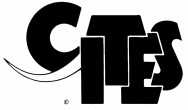TRAFFIC publishes advice and recommendations ahead of CITES CoP19
The now published Briefing Document outlines TRAFFIC’s views and advice on many of these priority issues and all the 52 proposals to amend the CITES Appendices on the agenda for CITES CoP19.
TRAFFIC's CITES CoP19 Briefing Document

The agenda of the 19th Conference of the Parties to the Convention on International trade in Endangered Species of Fauna and Flora (CITES CoP19) will be unfolding in Panama City on 14-25 November 2022.
The Parties to CITES will examine the progress made in the past three years on a wide range of species – from rhinos and big cats to pangolins and marine turtles – and recommend more robust action is needed. Commercially important fisheries and forestry commodities remain an important area of attention, with agenda documents outlining the next steps needed to manage sharks and Madagascar's precious timber species.
Other agenda items will build upon the strides made in previous CoPs on strategic issues such as demand reduction, corruption, and non-detriment findings. CoP19 will also consider a range of new topics of strategic importance, such as the potential role CITES can play in reducing the risk of future zoonotic disease emergence and alignment of CITES' Strategic Vision indicators with those of the post-2020 Global Biodiversity Framework. An important theme that cuts across many agenda items is how to effectively engage indigenous peoples and local communities in the CITES process.
A significant area of debate at CoP19 will be the proposals for stronger trade regulation measures through amendments to the CITES Appendices, with Parties proposing greater regulation of trade under CITES Appendix II provisions for all African populations of Pterocarpus timber species and the strictest international trade prohibitions under Appendix I of the Convention for a variety freshwater turtle species such as the Indochinese Box Turtle.
TRAFFIC believes that policy decisions and recommendations should be informed and guided by credible evidence and impartial analysis. For many of the issues addressed in this Briefing Document, we have highlighted recent TRAFFIC reports and other research that could assist Parties in their deliberations.
We hope that this briefing document provides Parties with important insights on how their decisions about these various agenda items and proposals can help ensure that wild plants and animals are not overexploited through unsustainable trade and that sustainable use of wildlife continues to provide benefits to conservation and human livelihoods.”
Richard Scobey, Executive Director of TRAFFIC
For many of the issues addressed in the Document, we have specific priority topic briefings accompanied by recent TRAFFIC reports and other research at the Parties’ disposal when preparing for their deliberations. Visit TRAFFIC’s CITES CoP19 webpage for continuous real-time updates and commentary perspectives on various CITES topics.
Members of TRAFFIC’s wildlife trade specialists from our international offices will attend CITES CoP19 and will be available throughout the meeting to provide explanations and further advice on request.
Convention on International Trade in Endangered Species of Wild Fauna and Flora (CITES)

The Convention on International Trade in Endangered Species of Wild Fauna and Flora, is an international agreement between governments that aims to ensure that international trade in specimens of wild animals and plants does not threaten their survival. Find out more here.





